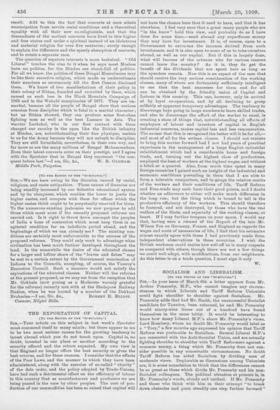[To TIM EDITOR OP TON "RP5OTATOrt."]
SIR,--We are here owing to the disunion caused by racial, religious, and caste antipathies. These causes of disunion are being steadily increased by our defective educational system and by its cheapness, which enables the lower to jostle the higher castes, and compete with them for offices which the higher castes think ought to be perpetually reserved for them. To the numerous existing jealousies we now propose to add those which must arise if the recently proposed reforms are carried out. Is it right to throw down amongst the peoples of India a bone of contention which must keep them in an agitated condition for an indefinite period ahead, and the beginnings of which we can already see ? The existing con- ditions are certainly most unfavourable to the success of the proposed reforms. They could only work to advantage when civilisation has been much further developed throughout the land. In the meanwhile the desire of the educated classes for a larger and loftier share of the "loaves and fishes" may be met to a certain extent by the Government nomination of Indians to the Councils, excepting, of course, the Viceroy's Executive Council. Such a measure would not satisfy the aspirations of the educated classes. Neither will the reforms at the present proposed, as we may see from the reception that Mr. Golthale (now posing as a Moderate warmly grateful for the reforms) recently met with at the Sholapore Railway Station, when he was hooted by a number of the Dekkani










































 Previous page
Previous page